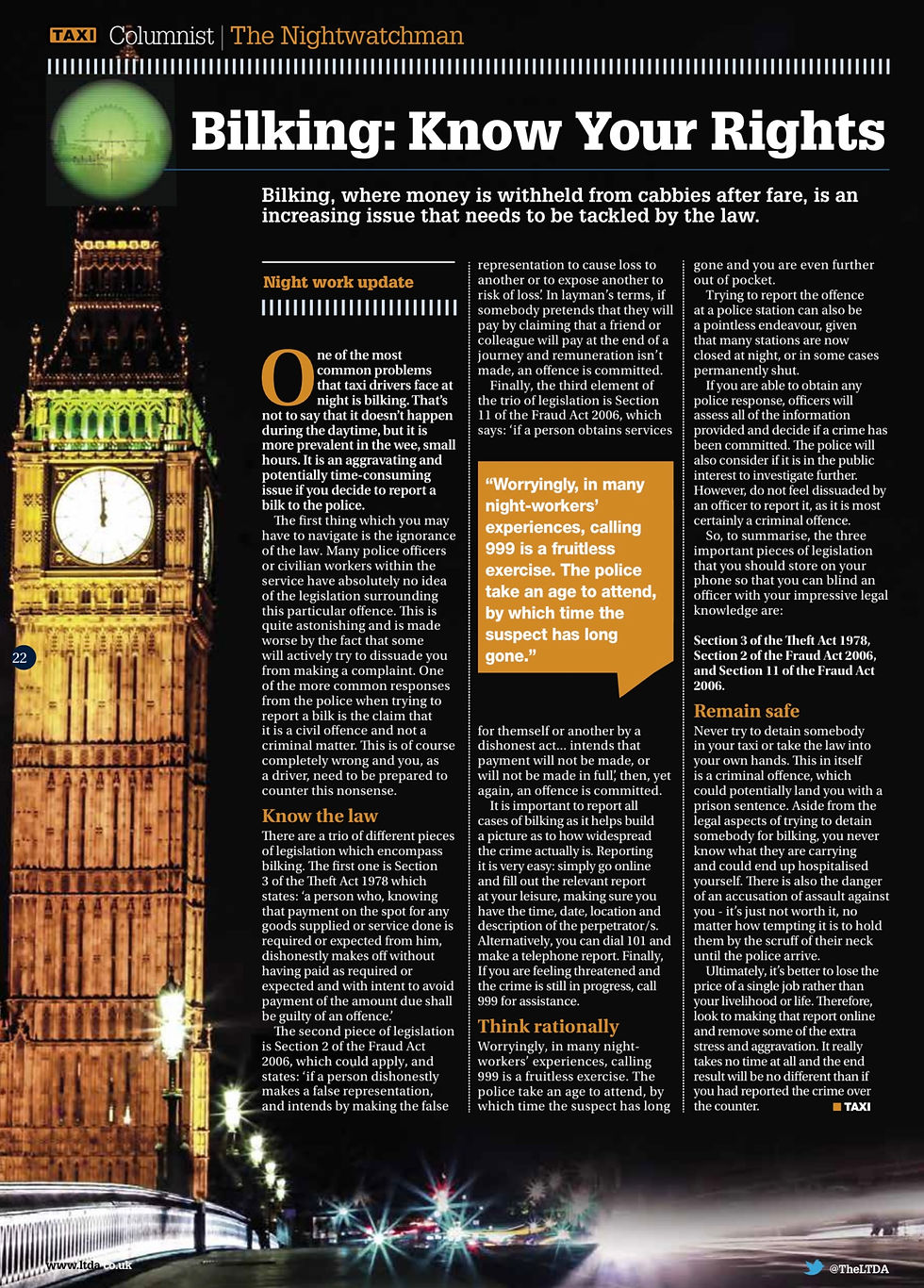KNOW YOUR BILKING RIGHTS: Taxi association releases information on how to deal with non-payers
- LTDA
- Sep 2, 2022
- 3 min read
Updated: Jan 12, 2024

One of the most common problems that taxi drivers face at night is bilking. That’s not to say that it doesn’t happen during the daytime, but it is more prevalent in the wee, small hours. It is an aggravating and potentially time-consuming issue if you decide to report a bilk to the police.
The first thing which you may have to navigate is the ignorance of the law. Many police officers or civilian workers within the service have absolutely no idea of the legislation surrounding this particular offence. This is quite astonishing and is made worse by the fact that some will actively try to dissuade you from making a complaint. One of the more common responses from the police when trying to report a bilk is the claim that it is a civil offence and not a criminal matter. This is of course completely wrong and you, as a driver, need to be prepared to counter this nonsense.
Know the law
There are a trio of different pieces of legislation which encompass bilking. The first one is Section 3 of the Theft Act 1978 which states: ‘a person who, knowing that payment on the spot for any goods supplied or service done is required or expected from him, dishonestly makes off without having paid as required or expected and with intent to avoid payment of the amount due shall be guilty of an offence’.
The second piece of legislation is Section 2 of the Fraud Act 2006, which could apply, and states: ‘if a person dishonestly makes a false representation, and intends by making the false representation to cause loss to another or to expose another to risk of loss’. In layman’s terms, if somebody pretends that they will pay by claiming that a friend or colleague will pay at the end of a journey and remuneration isn’t made, an offence is committed'.
Finally, the third element of the trio of legislation is Section 11 of the Fraud Act 2006, which says: ‘if a person obtains services for themself or another by a dishonest act... intends that payment will not be made, or will not be made in full’, then, yet again, an offence is committed'.
It is important to report all cases of bilking as it helps build a picture as to how widespread the crime actually is. Reporting it is very easy: simply go online and fill out the relevant report at your leisure, making sure you have the time, date, location and description of the perpetrator/s. Alternatively, you can dial 101 and make a telephone report. Finally, If you are feeling threatened and the crime is still in progress, call 999 for assistance.
Think rationally
Worryingly, in many night-workers’ experiences, calling 999 is a fruitless exercise. The police take an age to attend, by which time the suspect has long gone and you are even further out of pocket.
Trying to report the offence at a police station can also be a pointless endeavour, given that many stations are now closed at night, or in some cases permanently shut.
If you are able to obtain any police response, officers will assess all of the information provided and decide if a crime has been committed. The police will also consider if it is in the public interest to investigate further. However, do not feel dissuaded by an officer to report it, as it is most certainly a criminal offence.
So, to summarise, the three important pieces of legislation that you should store on your phone so that you can blind an officer with your impressive legal knowledge are:
Section 3 of the Theft Act 1978, Section 2 of the Fraud Act 2006, and Section 11 of the Fraud Act 2006.
Remain safe
Never try to detain somebody in your taxi or take the law into your own hands. This in itself is a criminal offence, which could potentially land you with a prison sentence. Aside from the legal aspects of trying to detain somebody for bilking, you never know what they are carrying and could end up hospitalised yourself. There is also the danger of an accusation of assault against you - it’s just not worth it, no matter how tempting it is to hold them by the scruff of their neck until the police arrive.
Ultimately, it’s better to lose the price of a single job rather than your livelihood or life. Therefore, look to making that report online and remove some of the extra stress and aggravation. It really takes no time at all and the end result will be no different than if you had reported the crime over the counter.









